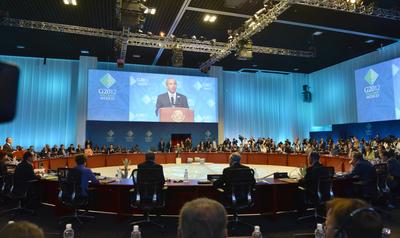The G20 summits are emerging as an incubator for new policy in international relations, and have become a platform where new ideas are considered and multilateral coalitions are born. It is too easy to miss these actions, which the media and experts have often done.
G20 summits are becoming anchors for a bigger, largely subterranean process for the development of norms and rules that proceed along at and also between summits. Today, the G20 is the key laboratory of global summitry for global governance reform.
So, how significant was the latest Los Cabos Summit in advancing the global governance agenda and bringing about economic and political coordination? Did the Summit help stabilise the global economy? And if it did, how significant were the roles of the large East Asian states?
The Los Cabos Summit confirmed the G20’s net positive impact on multilateralism and delivered two unexpected shifts: a growing Chinese leadership, particularly within the BRICS grouping, and a still timid, yet unprecedented, Sino–Japanese cooperation in global economic affairs.
It also delivered three important advances. First, every G20 country except the US and Canada committed resources to an IMF fund to stand against the euro crisis and its collateral effects in exchange for European pledges for a banking union and elements of a fiscal union. As a result, the Europeans gained some political space from the hounding financial markets in exchange for a commitment toward further institutionalising the euro zone. Coming after truly intense debates and confrontations, it was the most reasonable ‘deal’ imaginable at this point. IMF commitments, while significant, were not much of a surprise, as they mostly reinforced earlier commitments made in April at the IMF annual board meeting.
Second, the quid pro quo for these significant pledges, including from emerging and developing countries, reinforced the G20 countries’ commitment to move ahead with the ratification of IMF quota reforms, which the Obama administration’s unwillingness to put the required legislation before the US Congress before the fall elections is currently holding up. But the bargain remains: emerging powers will pitch in to stabilise the global economy in exchange for an increased voice in international institutions.
And third, the further institutionalisation of the Financial Stability Board, which is gradually emerging as a global financial organisation and standard setter, was also a significant advancement that came out of the Los Cabos Summit.
On the East Asian side of the ledger, two important events marked this Summit. The BRICS meeting took place on the morning of the first day of the Summit. The BRICS quintet issued a pledge to support each other in financial hard times through swaps of currency reserves. They also discussed the future possibility of building a BRICS bank, or the South–South Bank, as an alternative to the World Bank, which placed some pressure on developed economies at the G20. And while divergences of opinion also marked this BRICS meeting, the end results show China’s growing influence (backed by India in this case). It is China, with India’s tacit support, which convinced Brazil to back down on its refusal to contribute to the IMF pot. China’s leaders publicly expressed the requirements of all G20 countries to focus on the public good and the need to save the global economic system.
One of the most intriguing events at the Los Cabos Summit, however, was the unprecedented meeting between Chinese Vice Premier Wang Qishan and Japanese Finance Minister Azumi Jun, who sat down together to discuss G20 matters, particularly their visions for solving the euro zone crisis and providing IMF resources. This consultation may be the first explicit cooperative effort between China and Japan in the G20 after repeated confrontations from within different clusters, and may well reflect a spillover from increased trilateral cooperation between China, Japan and Korea. The emergence of the Trilateral Summit between the three largely went unnoticed in North America and Europe as a major architectural change to summit process. The fruits of this new Asian multilateral setting are already impacting on the bigger G20 summit. This needs to be watched ever more closely as the G20 takes on the challenges of global governance reform.
Alan S. Alexandroff is the Director of the Global Summitry Project at the Munk School of Global Affairs, University of Toronto. Yves Tiberghien is an Associate Professor of Political Science at the University of British Columbia and a Senior Fellow of the Global Summitry Project.

